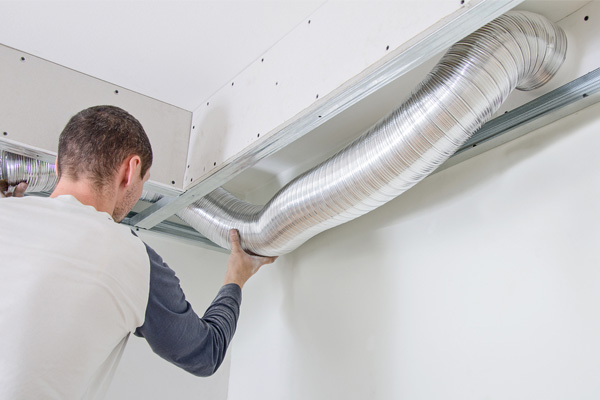Heating the home in winter is one of the biggest household expenses. According to the EPA, 42 percent of the energy we use at home is for heating. While energy costs have risen, the improved energy efficiency of today’s heating systems can offset those energy prices.
 Factors That Go in to Choosing a System
Factors That Go in to Choosing a System
Climate
If you live in a colder climate, you might need to opt for a larger system that can heat your home efficiently while minimizing heating costs over the long winter. For areas where the temperatures get really low, something like a Hyper-Heat heat pump would be optimal, as they provide heat in temperatures as low as negative 13 degrees Fahrenheit.
On the other hand, a portable heater or smaller zoned system may be better in temperate climates where heating is only needed on colder days. For example, a ductless heat pump system can provide warmth in specific areas of the house that need it most.

How much of the home you use
Do you need heat for the entire home, or just a few select rooms? This is an important question, as you don't want to pay to heat a whole house if it's unnecessary to do so. In cases where you won't always need to heat the whole home, choose a system with units/vents that can be closed or adjusted to stop heat from entering a specific room or area.
Type of installation needed/how much space is available
There are many types of home heating systems, and each will require a different type of installation. For example, radiant heating is often more efficient than a forced-air system, but could be harder to install in an existing home. This is why it's smart to consider the type of installation that'll be required for each type of system.
As another example, going with a large furnace wouldn't be the best idea if you live in a home or apartment lacking the extra space. A furnace would also require existing ductwork or the installation of ductwork, as it's a central forced-air system. If you have a smaller home or home without ductwork, opting for a ductless heat pump might be the best solution. Ductless systems take up less room, require minimally invasive installation, and work well for heating/cooling smaller areas.
Availability and cost of different fuel options
Different systems run in different ways. Furnaces and boilers can be gas or oil fueled, while heat pumps use electricity. Radiant floor heating and baseboard heaters can be both electric or hydronic. You should consider the cost to run each of these systems and consider which would make the most sense for your specific home heating needs. Scheduling a consultation with a specialist will help you in determining the best options and costs.
Your budget
Highly efficient systems, like heat pumps, may cost more upfront. However, energy-efficient systems typically have rebates and incentives to consider. The lower monthly costs associated with aspects like the ability to zone and more precise temperature control also offset the cost and give you a bigger payback. Considering how much you want to spend upfront and how much you will get back over time is another important factor in choosing a system.
Finding the Right High-Efficiency System
Furnaces and boilers
The newest furnaces and boilers are very energy-efficient. Furnaces work for homes with existing ductwork, while boilers are equipped to deliver heat in homes with radiators, baseboard heaters, and radiant floor systems. While older furnace and boiler models have AFUE ratings of 80 and 90 percent, the latest models tend to fall between 90 and 94 percent efficiency. Models from Trane can even reach up to 97 percent AFUE. Boilers also have long lifespans -- they can last decades if properly maintained. This offsets the hefty cost of a system upgrade or replacement in the future.
Heat pumps
Heat pumps are the most energy-efficient system. Today's heat pump can reduce your electricity use for heating by approximately 50 percent compared to electric resistance heating such as furnaces and baseboard heaters, according to the Energy Department. On average, a heat pump can transfer around 300 percent more energy than it consumes, compared to a highly efficient gas furnace average of about 97 percent more than it consumes. In addition to heat pumps being more efficient, they can also be ducted or ductless. This makes them suitable for any application and allows for more flexible installations.
Again, choosing a system won't just depend on which is overall more efficient. You will have to consider the other factors mentioned above to see what system pairs best with your home.
Efficiency-Boosting Factors
There are other details to take a look at when trying to boost efficiency. Your ductwork, system controls, and airtightness of your home can all make a difference in how well the system heats your home.
Ductwork
If you have a forced-air heating system, you may be losing a lot of energy (and money!) due to leaky ducts. Make sure all duct sections are sealed tightly together and aren't damaged with any holes. Ducts should also be insulated to prevent heat loss through the material itself.
 Controls
Controls
Opting for a programmable thermostat for your system will save you energy and money. Smart thermostats learn your habits and allow for more precise temperature control to provide you with the most efficient system.
Sealing and airtightness
Your house may have holes, gaps, cracks, or other openings where warm air could escape or cold air could come in. Windows, doors, or areas where the house frame connects with the attic are all common areas for these openings. Locating and sealing these gaps will prevent your system from losing energy and keep your house warmer.
The best way to find the right heating system for your home is to schedule a consultation with a professional contractor. A specialist will go over your specific needs and provide you with the most efficient and sensible options.

If you live in the Delaware Valley/Greater Philadelphia area and would like to find comfort within your home, visit our website or give us a call at 215 - 245 - 3200 to learn more.



